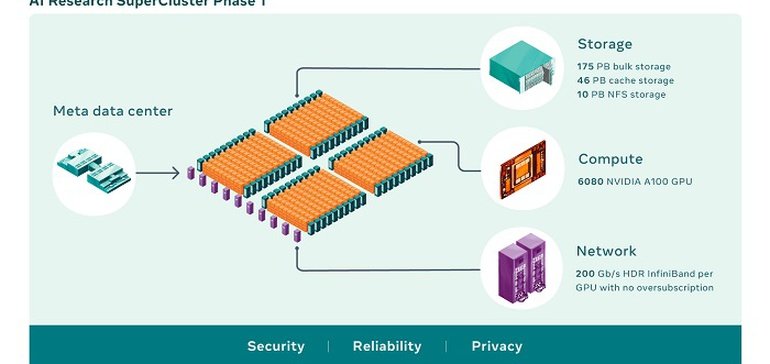SOCIAL
Meta’s Developing the World’s Fastest AI Supercomputer to Fuel its Metaverse Vision

As it looks to a future in the currently theoretical ‘metaverse’, Meta will need to up its computing power and systems in order to facilitate simultaneous connection in wholly immersive digital worlds, while it’ll also need more advanced computing power to fuel the next stage of its AI plans, in various forms.
Which is why Meta is developing a new AI Research SuperCluster (RSC), which it says will eventually become the fastest AI supercomputer in the world, when it’s fully built out by mid-2022.
The advanced system will eventually be able to perform ‘5 exaflops of mixed precision compute’ at peak. Which, I have no real idea of what that truly means, but basically, Meta’s new, advanced computational system will be able to process huge amounts of data, facilitating development in a wide range of applications, with a specific view towards the next stage of its metaverse vision.
As explained by Meta:
“RSC will help Meta’s AI researchers build new and better AI models that can learn from trillions of examples; work across hundreds of different languages; seamlessly analyze text, images, and video together; develop new augmented reality tools; and much more. We hope RSC will help us build entirely new AI systems that can, for example, power real-time voice translations to large groups of people, each speaking a different language, so they can seamlessly collaborate on a research project or play an AR game together.”
AR is clearly a key focus, with Meta developing its own AR-enabled glasses that will expand the use cases for the technology. The RSC will provide increased capacity to develop more complex AR systems, which could advance Meta’s tools beyond what’s currently available, which would ideally see its AR glasses become the top of the line, most advanced model available, helping Meta potentially dominate the space over rivals Snapchat and Apple.
Unless, of course, Snap and Apple team up, which is my prediction. But even so, with the additional computing power of the RSC behind it, Meta could still be well ahead, which could be a key step in bridging our current online experience to the next stage.
Which is where Meta is really focused:
“Ultimately, the work done with RSC will pave the way toward building technologies for the next major computing platform – the metaverse, where AI-driven applications and products will play an important role.”
It’s worth noting here that Meta specifically notes that the metaverse will take years to develop, it’s not something that’s happening overnight, nor will it become an all-immersive, integrated world by next year. Which is why any company or project that’s pitching itself as ‘metaverse ready’ is kidding itself – the metaverse, as it’s broadly envisioned, will require massive collaboration between platforms, in order to transfer your digital identity between virtual worlds, and take your avatars, skins, digital items, and more with you.
Meta is keen to reiterate that it won’t own that space, as such:
“No one company can (or should) build the metaverse alone. It will be built by people and businesses all over the world. And it’ll be important that experiences built by different companies or people, like avatars or virtual worlds, work together.”
But really, Meta is best-placed to host the party, via its industry-leading consumer VR tools and advanced computing systems like RSC, which will give it a significant advantage in dictating what the metaverse will be, and who will be able to sign up.
Eventually, this will require industry agreement on schemas and systems that will likely enable any service to join. But they’ll still need a host platform, along with software/hardware connection. Meta will be at the forefront of that aspect, which, again, will see it well-placed to define the rules of the space, and dominate the next stage of digital connection – whether it technically ‘owns’ it or not.
But it is worth noting that the metaverse does not exist yet, not in any form, and any platform or project that claims otherwise is ultimately misleading. Those NFT projects that claim to be ‘metaverse-ready’, yeah, no, maybe avoid them.
Eventually, Meta’s RSC will give it significant advantages in developing new systems for everything from combating harmful content on its platforms to building entirely new user experiences. The potential here is massive, and while it will take time to see the results of these developments, it’ll be interesting to see how Meta’s processes evolve in turn, and whether these advanced systems result in a significant acceleration in its development cycles.
You can read more technical details on Meta’s RSC project here.















You must be logged in to post a comment Login